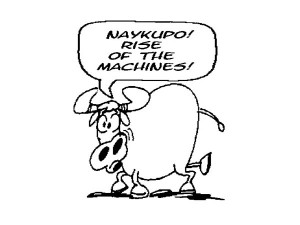Future coming when machines will have all the jobs

Smarter machines and better software were helping companies do more work with fewer people. His Silicon Valley software firm used to put its programs on disks and ship them to customers. The disks were made, packaged and delivered by human beings.
Now Ford’s customers can just download the software to their computers—no disks, no packaging, no delivery workers.
“It is getting easier and easier to avoid hiring people by taking advantage of technology,” Ford says.
An ordinary entrepreneur might simply have welcomed the cost savings. But something nagged at Ford: He wondered how a consumer economy—and 70 percent of the US economy consists of consumer spending—could function if machines kept dislodging the workers who did the vast majority of the spending.
“At some point you simply will have too few viable consumers to power a healthy economy,” he says.
So in 2009 he thought through what would happen to the economy if machines kept replacing human workers. The result was his book, “The Lights in the Tunnel.”
Apocalyptic vision
Ford, 49, describes a nightmare scenario. Machines leave 75 percent of American workers unemployed by 2089. Consumer spending collapses. Even those who are still working slash spending and save everything they can; they fear their jobs are doomed, too.
As people lose work, they stop contributing to Social Security, potentially bankrupting the retirement system.
Ford knows that his apocalyptic vision defies history. For two centuries, technological advances—from steam power to the combustion engine—have delivered more economic growth, more wealth, more and better jobs.
“The historical argument is compelling,” he says. “It’s been going on for 200 years.”
But this time is different, Ford contends.
Growing machine power
Machines can do more and more human work. They don’t just replace human brawn the way older machines did; increasingly, they substitute machine power for human brainpower.
And their powers will only grow. Computing power doubles every 18 months to two years. “Information technology continues to advance exponentially,” Ford says. “So the future impact is potentially going to be much greater than anything we have seen thus far.”
Just look at what the military is doing: Waging war with drone aircraft, deploying robots to sniff out bombs in Afghanistan.
“If you can build machines that operate autonomously on the battlefield, you can build machines that operate autonomously in a warehouse,” Ford says.
Keeping economy spinning
In this face of such relentless competition, what can mere humans do?
Don’t fight technology, Ford says. Smarter machines will make life better and increase wealth in the economy.
The challenge, he says, is to make sure the benefits are shared when most workers have been supplanted by machines.
He suggests imposing massive taxes on companies, which would be paying far less in wages thanks to automation, and distributing the proceeds to those left unemployed by technology. That would give them money to spend to keep the economy spinning.
To prevent the creation of a massive, idle underclass, Ford suggests paying incentives for people to keep going to school and to behave in ways that benefit the environment and society.
He admits his ideas are “fairly radical and politically untenable … But I don’t believe there are any easy conventional solutions.” AP